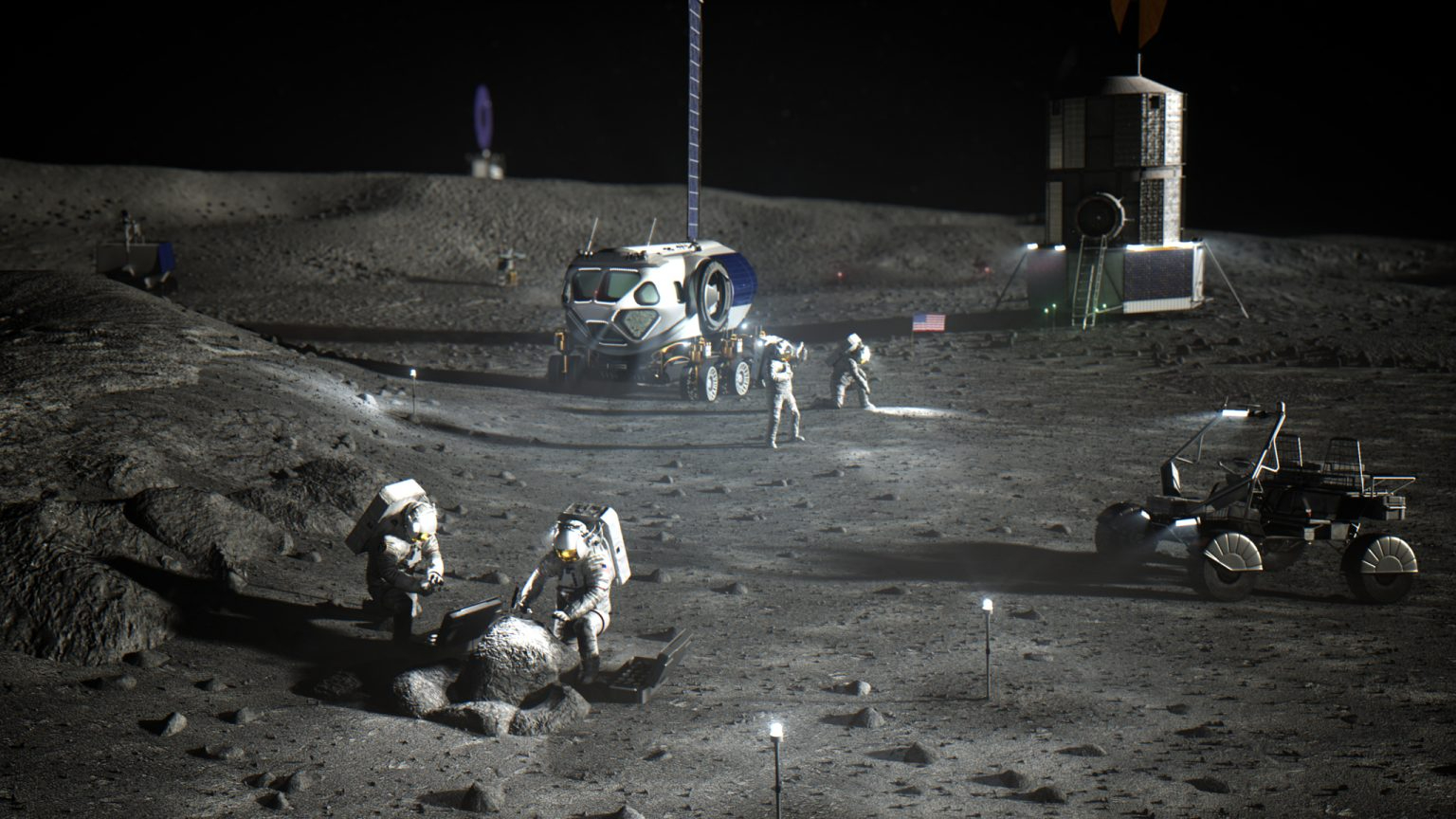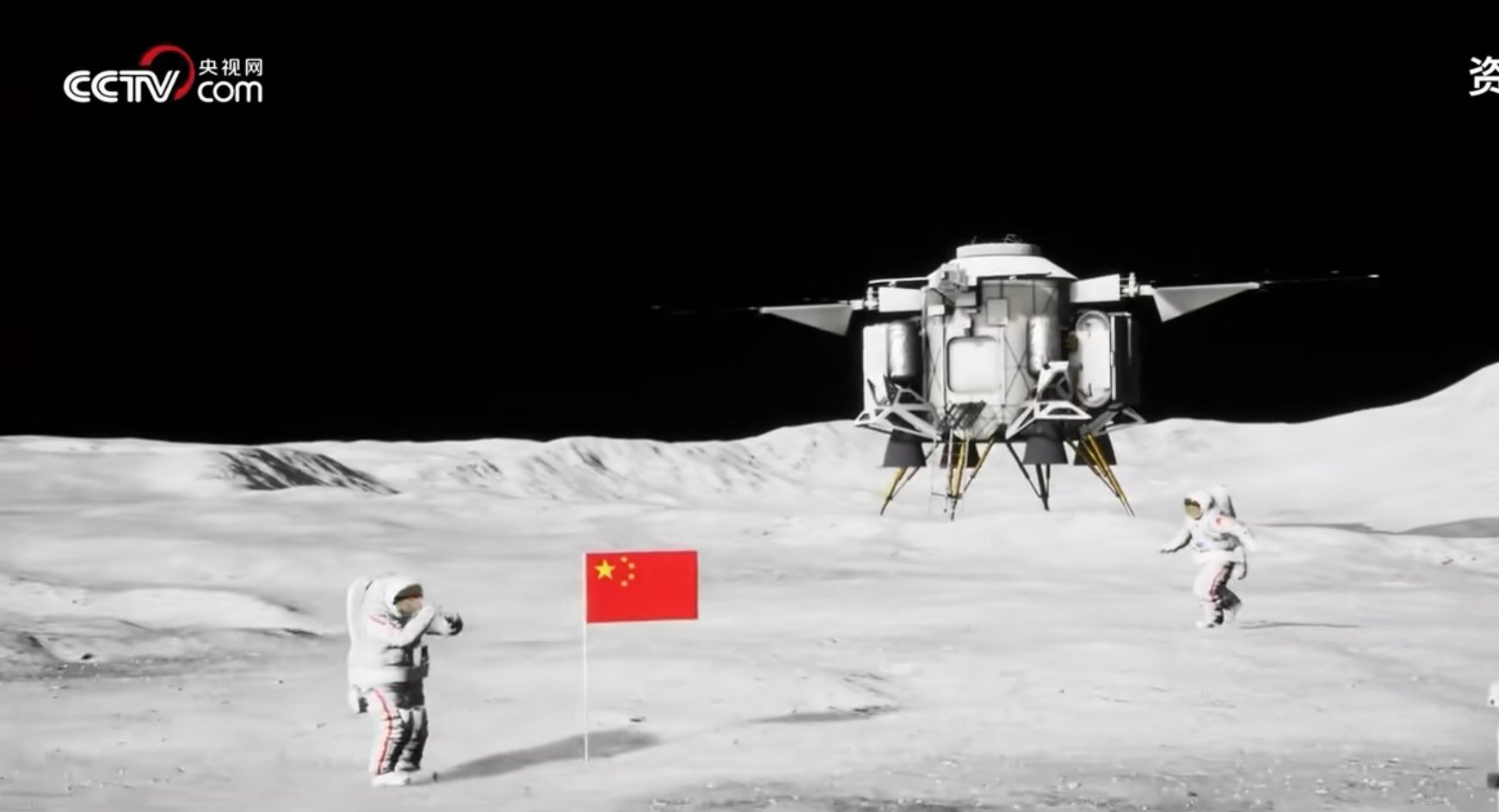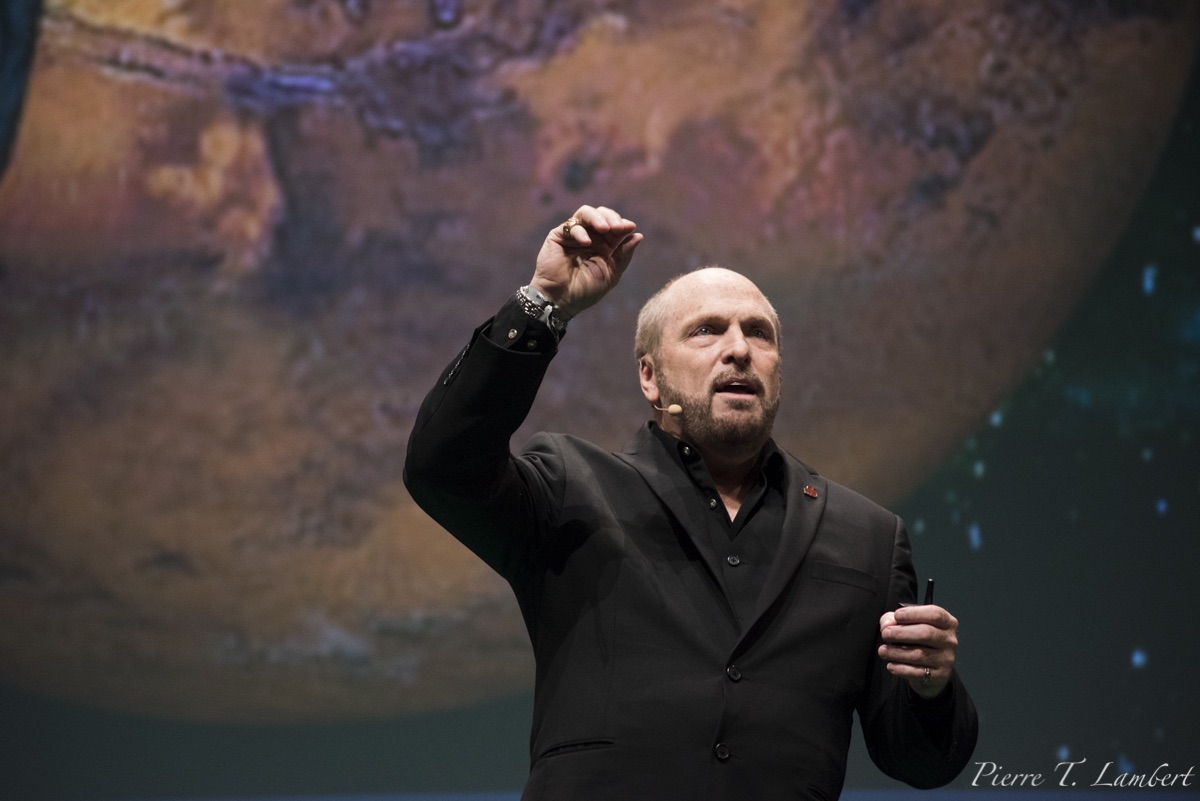The Space Force should safeguard US interests on the moon (op-ed)
The potential for conflict beyond Earth is coming.

It's been reported that United States Space Force Commander Gen. Chance Saltzman surveyed the Force's members to develop a mission statement for America's newest military branch. Aside from the novelty of crowdsourcing soldiers as to their interpretation of their mission (which I like but could draw criticism from more constitutionalist folks), the result seems to be on target: "Secure our nation's interests in, from and to space."
However — and with all due respect to the general from this son of a sergeant — I believe his interpretation of at least a part of this statement may be incorrect and informed by a bias that is all too common in the sometimes overly conservative and hallowed halls of the Pentagon.
First, having a simple and concise statement is essential. Shorter is better. Having that statement be co-generated by those forming the first cadres of the Force is an excellent idea to encourage buy-in and ownership.
Related: What is the U.S. Space Force and what does it do?
The term "secure" is also essential. Protecting U.S. national interests is the chief priority of all our military branches, from under the sea to above the sky and all places in between.
He interprets securing that national interest "from space" as the defense of systems and technologies such as communications, navigation and missile warning. In other words, protecting those elements of the defense infrastructure vital to what the military refers to as the "Joint Force" (i.e., all the branches that might be part of a combined military action or activity on Earth).
So far, this is all great stuff. However, what the good general is missing in his reading and interpretation, and perhaps, in what his soldiers are saying (although I bet not, given their probable age demographic), is anything referring to the outward-facing phase of developing space activities without reference to direct support of our on-the-planet military posture and capabilities. In other words, the Space Force's role in securing our national interests beyond low Earth orbit (LEO).
Get the Space.com Newsletter
Breaking space news, the latest updates on rocket launches, skywatching events and more!
Be it an oversight or intentional, this omission is revelatory of the Big Split within the Space Force. On the one hand, we have those who see it as a practical tool for supporting traditional strategies and tactics on the ground. On the other are those who believe (and in many cases are ringing the alarm bells) about the doctrine, strategy and tactics we need to develop now to "secure our nation's interests" beyond Earth orbit — places such as the moon, asteroids and beyond.
Primarily a function of Space Force's birth, this Earth-centricity results from being forged out of Earth-based military forces whose entire existence and functions are defined and limited to what happens on the little rock we call home. It is not incorrect at all. The Force is a new tool, allowing new ways of supporting actions on the land and in the water and air below. But far sooner than many realize, the utility of Space Force will become far, far more than that. It represents not just a new tool to be used in traditional domains. It is an early key to assuring our interests in the new space domain of the solar system — one that dwarfs all the rest.
Related: The US Space Force has a new mission statement to secure everything 'in, from and to space'
So here is where the traditionalists will expect me to begin to wax poetic about the human expansion into space, the establishment of new human communities on the moon and Mars, and the Free Space between worlds. Consider it done and done with conviction, as we are on the verge of what I have long called the Space Revolution finally reaching its goal of enabling the human breakout into space.
Others might expect me to call for a "Star Trek"-like shifting of the Force toward boldly going where no one has gone before. Again, consider it done and done. Just as navies and government explorers of the past, such as Lewis and Clark, have helped open our frontiers down here, I also urge this positive and enlightened mandate be built into the evolving mandate of our Guardians moving forward.
However, what I am calling for right now is that Gen. Saltzman and those around him who see the Force looking down from space re-interpret the voices of their people to mean it is their job also to lift their gaze and look outward at the threats already developing beyond LEO.
The leadership of the Space Force must begin to prepare for the next war rather than just adding better tools to fight the last. With just a little imagination, they can begin preparing now to "secure our nation's interests" on the moon and elsewhere in cislunar space. More importantly, they can set the tone of acceptable ideation within the service, encouraging not just innovative ways of using space assets on Earth, but forming a leadership cadre that "gets it" when it comes to winning the wars of the 22nd century (now within the lifetime of its youngest Guardians) rather than those of the 20th and before.
For example, with a shift in their mindset and willingness to take a bit of risk, they can begin the planning and long-lead work now — before we find ourselves responding to adversaries building "islands" in the sky.
We already know the intent of China in space. They tell us yearly in their Congresses and through announcements and utterings, such as a recent resource roadmap of the solar system published by one of their top scientists. (Let's be clear: nothing in China of such note gets "accidentally" published, nor are they ever just "thought" pieces.)
Related: 'We're in a space race.' NASA chief says US 'better watch out' for China's moon goals

For decades, we in the Frontier community have known that "ownership" (immediate dominant presence, if you will) of the lunar poles equals control of the inner solar system. With India at the South Pole with their brilliant Chandrayaan-3 mission, they clearly get it, too. Had the once great Russian space program not just sadly exhibited the same competence in space they are showing in Ukraine, they too would be marking their future territorial ambitions on the gray sands of Luna.
The potential for conflict beyond Earth is coming. I hate that it is coming. I hope we can avoid it and find ways for all of us to work together to open the resources of the moon and the spaces between worlds in ways more focused on the citizens of Earth than on those few who hold power. But as any good general will tell you, we must prepare as if this will fail, even as we work for it. And thus, my difference with the good general and my suggestion to him.
Along with the apparent need to support and enable the other terrestrially bound services of the Joint Force, securing our "national interests IN space" includes protecting our current assets, such as satellites. Yet, it means so much more, which needs to be articulated from the top. It also means preparing now to secure what Americans from NASA to the thousands of entrepreneurs and others in free societies worldwide are sweating to build every day — a beachhead for freedom on the Frontier beyond Earth. This cannot be just a nod nor lip service, but implementation, starting with the strategies and doctrine that will inform planning for the future and signal to others that the U.S. military has not ceded its vision and is preparing for that future now.
Space Force can support those who walk and float on the old ground and seas of Earth and those working to open the Frontier at the same time. The Guardians can protect our ability to wage and win traditional confrontations down here — and should have this as today's prime focus. And, right now is the time to begin developing the Force of tomorrow that can, by its clear focus, intelligent design and superiority "secure our nation's interests" for the decades and centuries to come IN space by deterring those of malign intent from even starting plans to take the high grounds of the High Frontier.
Rick Tumlinson is the founder of SpaceFund, a venture capital firm investing in space startups. He also founded the Space Frontier Foundation, Earthlight Foundation, the Space Cowboy Ball, was a founding board member of the X Prize Foundation and hosts the Space Revolution podcast.
Join our Space Forums to keep talking space on the latest missions, night sky and more! And if you have a news tip, correction or comment, let us know at: community@space.com.

Both a rebel and a respected leader, Rick is listed as one of the top 100 influential people in the space field. Called one of the world’s top space “visionaries,” Rick helped coin the term "NewSpace" and worked to create the new commercial space industry highlighted by Elon Musk and Jeff Bezos.
A leading writer, speaker, and six-time Congressional witness, Rick helped start the first mission to find water on the Moon, signed the first ever commercial data purchase agreement with NASA, helped start NASA’s Lunar Exploration Analysis Group, led the commercial takeover of the Russian Mir space station, signed the first private astronaut to fly to the space station, co-founded the Space Frontier Foundation, and was a founding board member of the X-Prize.
As a result of his world-changing work, in 2015 he won the World Technology Award along with Craig Venter of the Human Genome project. He founded the SpaceFund venture capital company with 19 space companies in its portfolio and is a member of the US Space Force Doctrine Advisory Group.
Rick's The Space Revolution "radiopod" is featured on IHeart Radio Network's iRoc Space Radio and is available on most major podcast sites. He hosts the New Worlds Conference and the Space Cowboy Ball in Austin, Texas, and his non-profit EarthLight Foundation is creating an inclusive new movement to use space to protect the Earth and expand life into the cosmos.
-
fj.torres Valid points all.Reply
No debate needed but instead a reminder that scheduling matters.
1- USSF is still in its infancy, still transitioning from its dirt- focuses origins to its full, mature evolution (circa 2040?). USAF wasn't born fully formed either and it can be argued it didn't come into maturity until the '80's. The new mission statement is a big move forward, in the right direction. Space threats are still dirt based. And the tech needed for the next stage is still developing. Give'em time to find their footing.
2- Jumping to Lunar concerns is a bit premature. Necessary for long term planning but not an immediate concern. A more immediate focus needs to be the high orbitals. GEO and cislunar space. For that, USSF needs a few things. Starshield 1 is the first step. A hardened C&C constellation is a prerequisite for serious orbital security. Clearing out the space junk is next. Proving the ability to n-i-p a Kessler syndrome in the bud is a good way to deincentivize physical atacks on space infrastructure. Third in line in this vein, USSF will need its own rapid response, *independent* launch system, preferably from hardened silos. Not hard to see USSF procuring a handful of mature STARSHIP derivatives by the next decade. Just as STARSHIELD is to be independent but comparable to STARLINK, shifting any attacker's main focus to the military constellation and thus reducing the value of attacking the civilan systems.
3- A decade ago, George Friedman's geopolitical "tutorial" THE NEXT HUNDRED YEARS correctly "predicted" the geopolitical rise of Poland, Turkey, and (again) JAPAN. Looking to the 40's, he posited the need for manned GEO watchtowers he termed BATTLESTARS for look down (shoot down) control of the high orbitals. By that point things can get science fictional but as the book points out, you can't protect the US and its civilian and military assets solely from the ground. Don't be surprised if it comes out that USSF advance planners are strategizing how to secure the high orbitals *without* triggering an orbital arms race.
4- By mid century, securing the moon and beyond will start to be necessary. Particularly if space mining and manufacturing proves economically viable. Big if. But the mission to Psyche will shed some light on the ceiling for an asteroid driven economy. Again, that verges into hard SF territory and a problem for the zoomers' grandkids.
For now, USSF needs to set in place the culture, direction, and infrastructure to deal with today's problems and allow early control of tomorrow's. So far nothing suggests they aren't despite their limited budget.
Give'em time. -
Ferg1999 Reply
Everything about the attitude in this article is deeply against every bone in my body. This Cold War mentality is exactly the sort of thing that will bring about conflict. Just as the USA stubbornly holds onto its freedom to bear arms in spite of disgraceful statistics attesting to the increased mortality risk arising from that ‘freedom’ when compared to nearly every other country, the very existence of the space force accelerates the rush ti militarise space. ‘The potential for conflict beyond Earth is coming’, and the US is leading the charge to bring that future to reality. No other nation has either openly or through their actions moved towards militarising space, and this preemptive approach would make me ashamed if I was from the US. The space force should not have survived beyond the Trump administration, and the money going to it could far more usefully be spent on attempts at peaceful cooperation in humanity’s expansion into other celestial bodies. ‘US interests in space’, do you even realise how small-minded and parochial that sounds? In case you’re wondering, I’m not a Chinese or Russian troll, but Western European.Admin said:While the Pentagon sees the Space Force as a tool to fight the last war here on Earth, its leaders must prepare for its real role in space, on the moon and beyond.
The Space Force should safeguard US interests on the moon (op-ed) : Read more









